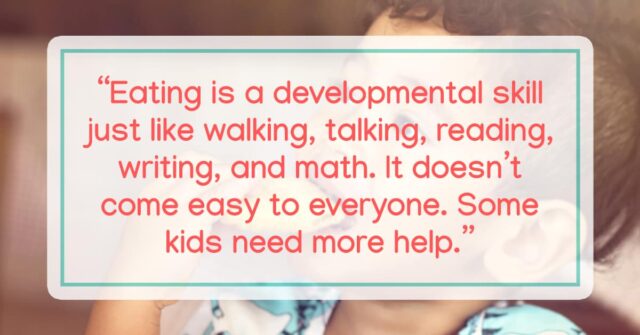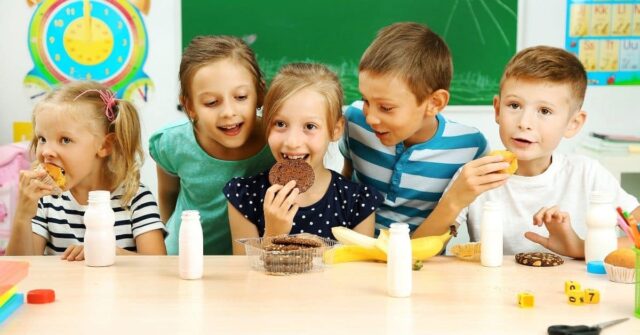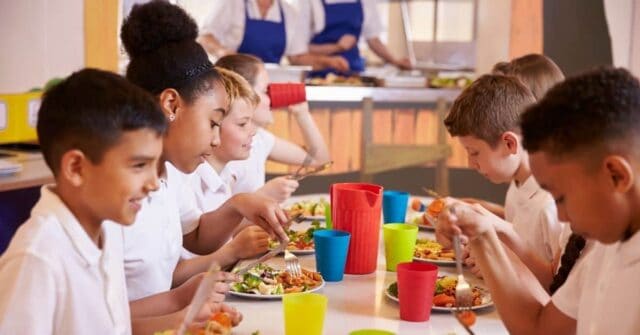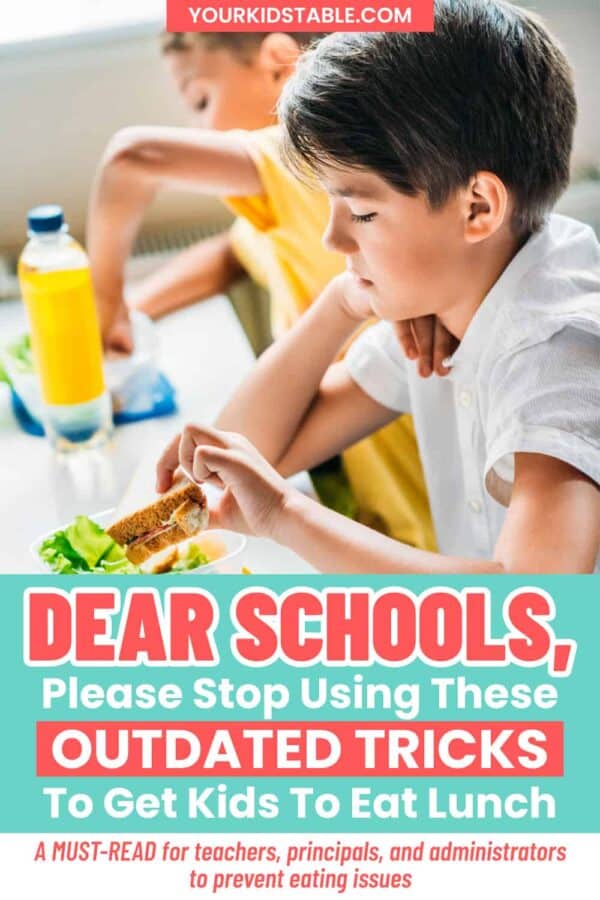A special message to schools trying to help picky eater kids at lunch. What to avoid that often makes kids eating worse and what you can do instead!
My heart skipped a beat, and then my jaw clenched as I read yet another story of a school using rewards to encourage kids to eat “healthy” foods.
Dana* is a mom and student in our picky eating program, Mealtime Works. She posted this in our private fb group:
Looking for advice about ‘clean plate award’ stickers
So my daughter came home from school with not one, but four, clean plate award stickers today. I hadn’t even realized they did these because she’s never had one before. I’m not sure how to feel about it.
Firstly, I don’t like these stickers anyway because I’m trying not to pressure her into eating and to listen to her body. So there’s that side of it.
But, the reason she’s never had one is because I always pack her at least one item in her lunch that isn’t on her safe list. I know she won’t eat it, but I figure the exposure is good for her and she might try it one day. Today, she only had safe foods because I didn’t have anything extra to give her, hence the stickers and I bet they went overboard because it was the first time she’d eaten everything.
Anyways, now I feel bad because I’m wondering if she’s ever sat there upset or frustrated that her friends were getting stickers and she wasn’t, even when she was trying her best and eating literally everything except the new food.
What do I do?! I don’t feel I can ask the school not to include her in this because she won’t understand why and I don’t want her singled out. But, ugh, I wish they could see how problematic these things can be!
Any advice appreciated!
I wish I could say this is an isolated event, but far too often, I hear from our students and other parents in our community that well meaning pressuring techniques are happening at the school level, or led by a teacher in the classroom.
As angry as this situation makes me, I also know that this school is trying to help kids eat better. Their heart is in the right place, and while strategies like the clean plate club were widely used a generation or two ago, we know better now.
We know from long and short term research studies the damage that this can cause to a child’s relationship with food today and for the rest of their life.
What Does the Research Say About Pressuring Kids to Eat?
While I’m a pediatric occupational therapist that has specialized in picky eating and feeding issues in children for over a decade, here’s some of the research to support that pressuring kids to eat can be detrimental, and which strategies are more effective instead:
- Ellyn Satter’s testing of the division of responsibility. See other related articles related to her work here.
- Picky eating, pressure feeding, and growth in toddlers
- A review of restrictive feeding practices in the Journal of Pediatric Obesity
- Complementary feeding strategies to facilitate acceptance of fruits and vegetables
The research consistently points to children being offered a variety of food, encouraging interaction, but not forcing, coercing, or pressuring children to eat it.
Several well known national programs and organizations such as the SOS Approach to Feeding, the Ellyn Satter Institute, and The Child Feeding Guide all have informative pages that illustrate the importance of this approach with children.
The SOS approach states that there are over 100 scholarly research articles that support the techniques, such as not pressuring kids to eat.

Some Children in Classrooms Have a Disorder…
We also suspect that as many as 1 in 37 children have severe difficulties with eating a variety of food that goes well beyond “picky eating” and now qualify for a new diagnosis called Pediatric Feeding Disorder (PFD) as of October 2021. Other children may have an eating disorder known as Avoidant Restrictive Food Intake Disorder (ARFID) and experts estimate that 5% of children may have this diagnosis.
That means that in the vast majority of schools, there are children sitting in classrooms and schools that have severe picky eating, PFD, or ARFID that prevent them from being able to try a new food with classic behavioral techniques like the clean plate club, sweet treats as rewards, or asking kids to eat their “healthy” food first.
They aren’t able to comply with these techniques because they have oral motor, sensory, or medical issues that prevent them from eating the way the average child does.
And, in many cases, these children are working with feeding therapists or in a program like Mealtime Works to help their children learn to eat more food from an expert in these areas.
Rewards and the Clean Plate Club Can Be Harmful…
Not only is using these techniques not fair to these children, it’s punishing them for something they cannot do, and undoing the strategies parents are working tirelessly on at home. Just like Dana* who said “I’m trying not to pressure her into eating and to listen to her body.”
Dana* isn’t just doing that because she’s following her intuition, although that’s a good enough reason as a parent, she’s doing that because that’s what she’s learning from an expert to help her daughter progress with eating new foods.
Children can have delays and difficulties with every single aspect of development: talking, reading, math, gross motor skills, sensory processing, following directions, attentiveness, social skills, fine motor skills, vision, hearing, and many more.
Guess what else is a developmental skill that children can have difficulty with…?
Eating.
Yet, as a society, we tend to look at eating as a black and white issue that must be managed by behavioral techniques. Unfortunately, when a child is struggling to eat well, the problem isn’t that simple.
We’d never ask a whole school of children to read a passage in a fixed amount of time perfectly with the promise of a sticker or some other reward, because teachers understand that some kids struggle with reading and may not be able to complete it successfully.
It wouldn’t be fair.
It would hurt some kids self-esteem.
It’s the same thing when we ask a whole group of kids to eat all their food, or to eat their healthy foods first, and some are incapable of doing so.
Anytime you find yourself thinking, “If only his mom/dad would offer him fruits/veggies/healthy foods he’d learn to eat them.” Be careful, because there could be a whole host of problems that child is dealing with that aren’t apparent to you.

What to Avoid When Kids Eat at School
There are several ways we can pressure kids to eat around the family dinner table or in the cafeteria. As a teacher or administrator in a school that wants to help kids have a lifelong healthy relationship with food, you’ll want to avoid:
- Rewarding with food at any time. (This includes using candy and treats for academic achievements, following directions, etc.)
- Rewarding with stickers, toys, recess, or any other motivator if a child finishes their food or eats “healthy” food first.
- Excessive praise and attention when a child does eat a new, different, or “healthy” food.
- Bribing children to eat more or all of their food (i.e.: if everyone finishes their lunch today we can watch a movie)
- Guilting or shaming them into eating more with statements like:
- Don’t you want your eyes to be strong, eat your carrots?!
- Your mom packed that really nice lunch, are you going to waste it?
- You should eat the healthy foods first so that you’ll be big and strong
What You Can Do to Help Kids Eat More Healthy Foods
Instead of these types of statements, we can do far better by teaching children about food and creating opportunities for them to interact with healthy foods in a positive way.
Here’s 3 ways you can support all children’s eating and food choices in your classroom or school:
#1. Eliminate pressuring techniques around food at least at the school level, ideally at the district level. This is a top down approach where principles can set guidelines for all teachers and staff about the importance of no longer using pressure techniques or rewarding behavior or academic achievements with candy and treats.
*If you’d like some printables to use in your school, leave a comment below and if there’s enough interest, we’ll create some for free!
#2. Teach children about nutrition without shaming, blaming, or guilt.
Nutrition education is important, and there’s a way to teach kids about nutrition that makes them feel bad about what they eat. And, there’s a way to teach them about nutrition that empowers them to eat new food. Read about how to teach nutrition well.
#3. Include curriculum or special learning opportunities for interaction with fruits and vegetables.
At nearly any grade level, teachers can have a dedicated time weekly or monthly where children learn about a new fruit or vegetable. Teachers can teach kids where the food comes from, the history of the food, and ways to cook the food. Increase the likelihood that kids will eat this food by giving kids a chance to cut, feel, and interact with the food in the classroom.
If you’re teaching preschool or kindergarten aged children, there’s a wonderful curriculum called Dr. Yum’s Preschool Adventure that provides teacher training, curriculum binders, and recipes to share with families.

Spread the Word!
As I write this article to schools, teachers, and administrators that are using pressuring techniques at meals in school, I know you’re trying to help children eat well. With some simple but powerful changes you can do that for all children in your school!
If you have any questions about what you’ve read or next steps for your school or classroom, please ask them in the comments below.
If you’re a parent that is struggling with your schools policy around pressure techniques in the school setting, please share this article with them, you can copy and paste the link from your browser at the top or bottom of your screen.
*Name changed for privacy. Dana is not the mother’s name that posted the story at the top of this post.
More on Supporting Kid’s Nutrition
Want Your Kid to Eat Better? Try These 7 Things That Work Like A Charm
Maximize Your Kid’s Nutrition with These Easy Alternatives to Popular Snacks
How to Remove Processed Foods From Your Family’s Diet
Healthy School Snack List Printable
Alisha Grogan is a licensed occupational therapist and founder of Your Kid’s Table. She has over 17 years experience with expertise in sensory processing and feeding development in babies, toddlers, and children. Alisha also has 3 boys of her own at home. Learn more about her here.

Looking for advice as a Pre-K teacher…
Most of my students eat well at breakfast, lunch, and snack time. I have never required them to have a “happy plate” and am just glad when they decide to eat any amount—which they often eat well.
However, I have one child who refuses to eat. Upon inquiry I find he only eats limited raw fruits, bread, and chicken nuggets. He turns down everything else even if it is “kid food” like hot dogs and Mac and cheese.
Do you have any advice as what to do? I would hate for him to go hungry throughout the day just because we didn’t serve bananas for breakfast.
Hi Abby,
This definitely sounds like more severe picky eating than what is considered “typical” for this age. We have a whole picky eating section (many many blog posts and a free workshop) that may be good resources as a starting point! The key is determining the underlying cause of the picky eating and there are several articles that’s may help get there!
Best,
Laura
Your Kid’s Table team member
Printables for the school would be great! I am trying to figure out how to say something to my son’s preschool as the teacher tells him that pizza and french fries are not healthy (along with labeling lots of other foods as healthy and not healthy.)
Hi Janelle! Thanks for letting us know! We understand it can be difficult when talking to your child’s school about these things. It’s unfortunate that they’re uninformed and continue to label foods this way. It definitely doesn’t help! A good way to educate them would be to send them the link to our blog post! Let us know if you need anything else.
Best,
Kalyn
I would like some printables to use in my school. I would also like to say thank you for all your posts! I find them so very helpful!
Hi Caressa! Thanks for letting us know! We are so glad you enjoy our posts!
Best,
Kalyn
We wrote a very large note that takes up the whole inside inside of my son’s lunch bag with a sharpie. It says that he needs to only eat the amount that he feels his body needs, and can bring the rest home. That he does NOT have to eat all of his food.
Hi Mandie! Thank you for your comment! This is an excellent idea and a great way to instill a no pressure environment with your child, especially when he’s away at school.
Best,
Kalyn